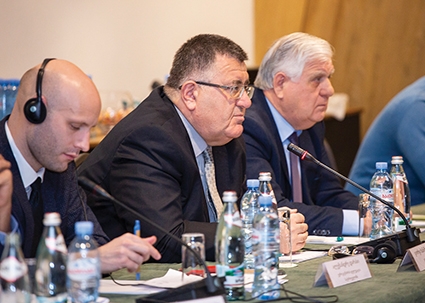Consultations on Draft Technical Regulations for Waste Management Held
A long with the development of the world and growth of its population, the amount of waste is increasing. Waste disposal sites, covering huge areas worldwide, represent a serious threat to the environment, augmenting the level of pollution and the risk of the spread of new diseases.
Waste management is considered a vital solution to maintaining nature and urban surroundings in a clean and safe manner, conserving beauty and keeping the good health of the world’s population.
There are numerous campaigns and projects being carried out globally to raise awareness about the significance of waste management, and Georgia is included on the list of those countries interested in the given field.
A two-day consultation meeting was held on January 16-17 in Tbilisi’s Holiday Inn, attended by more than 150 representatives of private companies engaged in the management of specific wastes, relevant state agencies, and donor and civil society organizations. The event aimed to present and discuss draft technical regulations for managing specific waste streams, subject to EPR (Extended Producer Responsibility).
The meetings were organized at the initiative of the Ministry of Environmental Protection and Agriculture of Georgia (MEPA) with the support of the European Union, specifically two EU-funded projects: ‘Technical Assistance for the Improvement of Waste Management Systems in Georgia’ (EuropeAid/138609/DH/SER/GE / EU TA project) and ‘EU Technical Assistance for Awareness and Communication to Improve Waste Management Practices in Georgia and the Visibility of EU Support to the Sector.’
In their welcoming speeches, representatives of the MEPA and EU TA project highlighted the importance of EPR in effective management of specific waste streams. Afterwards, EU TA project experts presented the background situation existing in the area of the management of specific wastes, EPR general provisions and draft technical regulations for specific wastes. A discussion was held on given legal documents and concrete recommendations were given by the stakeholders.
The Waste Management Code of Georgia introduces the concept of Extended Producer Responsibility (EPR) for specific waste streams which will be enacted from December 2019. According to the new Code, manufacturers and legal entities who place products onto the market are responsible for ensuring the reduction of negative environmental impacts that may follow the production and use of the products and their waste recovery or disposal.
Georgian businesses who produce or import a product, which after its use becomes specific waste, will be obliged to manage these specific waste streams.
These streams are as follows: packaging waste (plastic, paper/cardboard, wood, metal, glass), waste electrical and electronic equipment (WEEE), end-of-the life tires (ELTs), end-of-the life vehicles (ELVs), used oils, used batteries and accumulators.
Extended Producer Responsibility is a new concept for Georgia and its introduction requires the relevant legal framework and adequate public and private sector awareness. EPR is a policy approach to waste management successfully implemented throughout Europe.
George Konstantinopoulos, Project Legal Expert/EPR at the meeting noted his expectations of holding fertile consultations with positive outcomes with the representatives of the Georgian business sector.
“There are more than 25 years’ experience in the European Union regarding the introduction and implementation of EPR for all waste streams. Our main task here is to assist the Georgian government and stakeholders and to have a fertile dialogue regarding how and under which conditions we may be able to actually implement EPR in Georgia,” he said.
The EU official also accentuated the capability and professionalism of the Georgian government for the further development of the given project. Finally, as his top recommendation, he focused on the significance of establishing platforms of this kind and the need for negotiations between the government and the business sector.
The Georgian guests at the event also emphasized the effectiveness of this type of event to further the sustainable development of the country.
By Ketevan Kvaratskheliya











